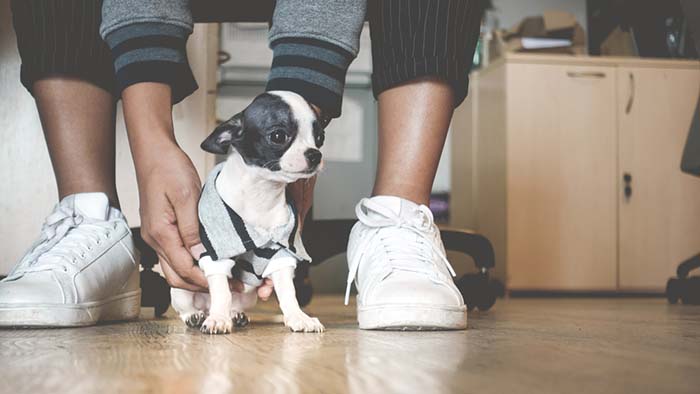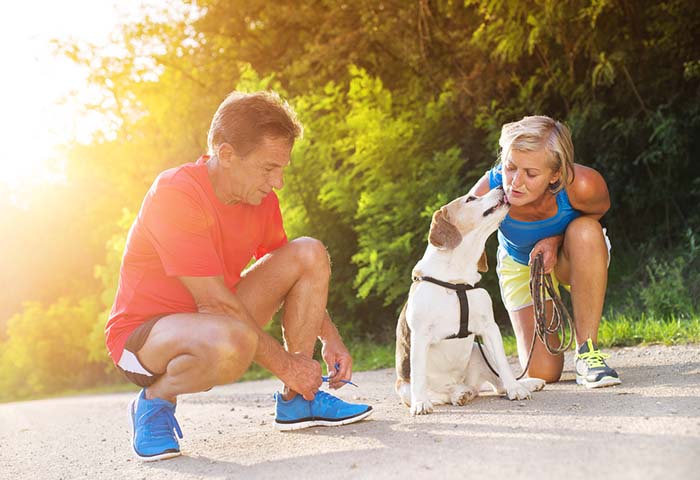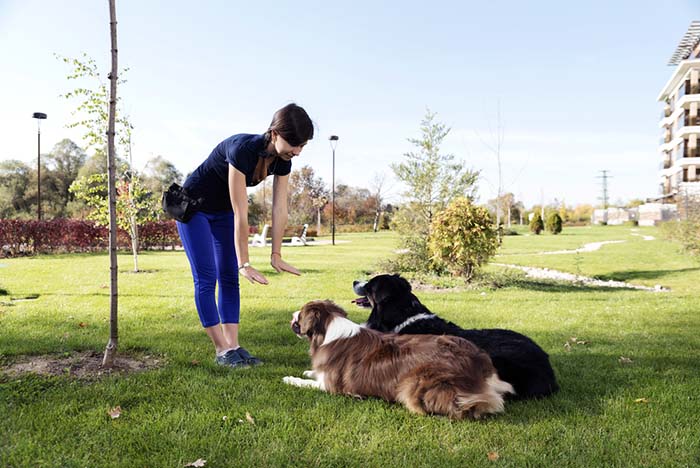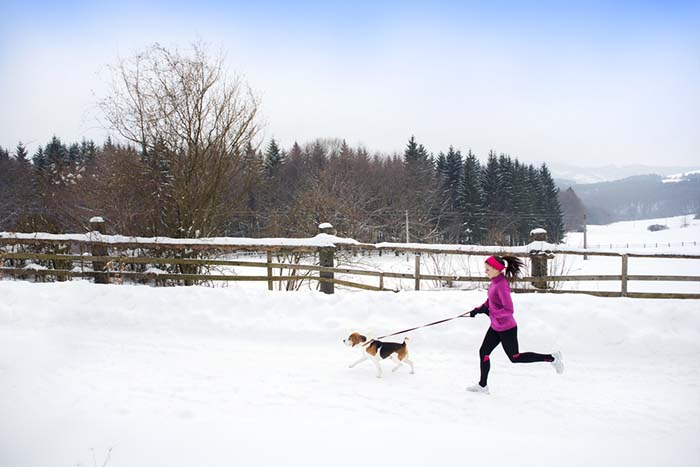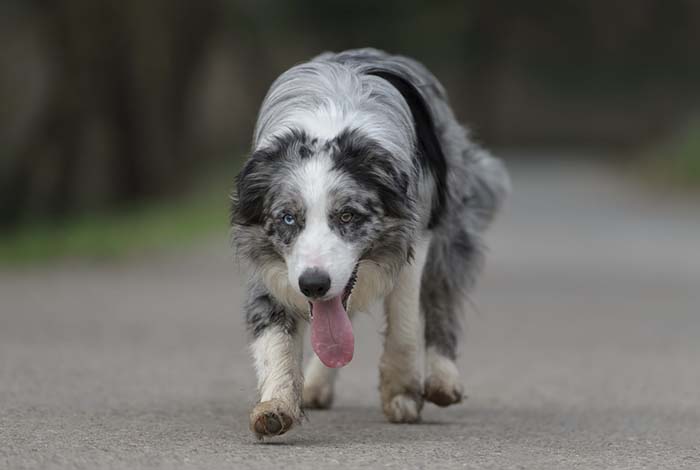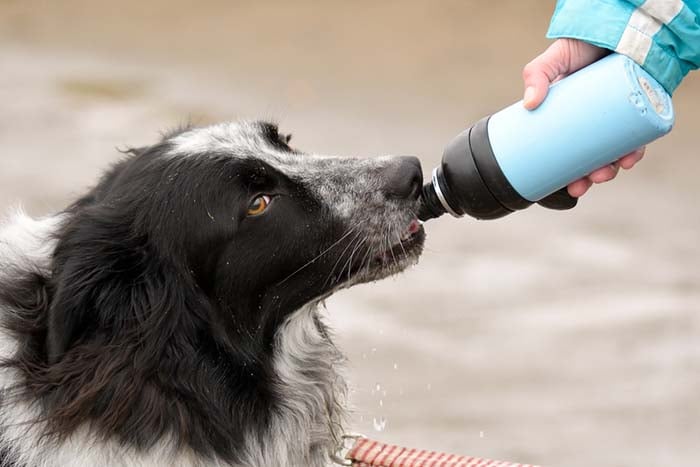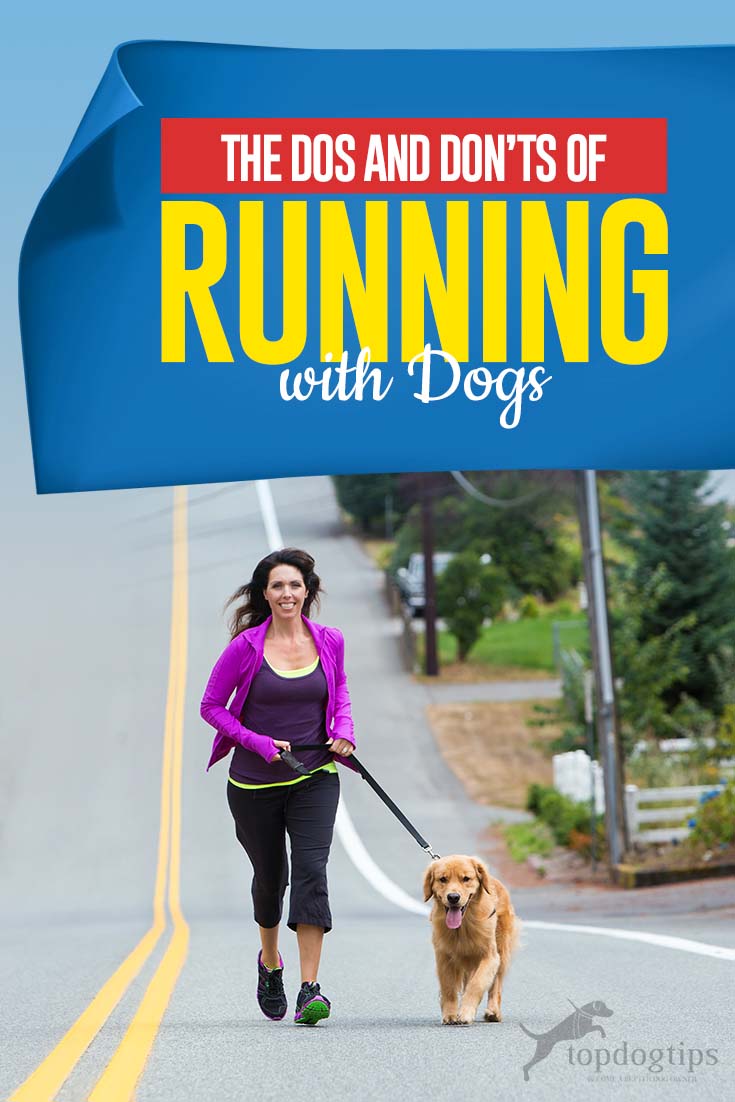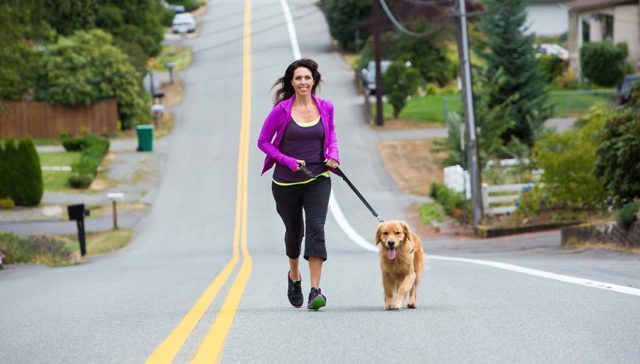
Table of Contents
When it comes to the right and wrong things to do when preparing to start actively running with your pooch on a regular basis if you can live by one ‘Do Not,’ it’s this: Don’t jump right into running with dogs head-on without a vet's consultation, preparation, and training.
Instead, take note of the following tips, and whether you’re looking to get yourself or your dog in a better shape by jogging or exploring a new hobby, you and your running canine companion will soon be getting fit and having fun and doing it safely, too.
ALSO READ: What Are Running Shoes for Dogs and Do Dogs Really Need Them?

Talk to a Veterinarian
Whenever you make the decision to change your dog’s lifestyle, whether that involves what they’re fed or how often their fed, introducing a new family member into the mix, or greatly changing their daily routine and including more exercise – you should consult with your veterinarian.
Something that may seem rudimentary to you (a new home, a new job that keeps you away for a longer period of time, or a new hobby) can affect your pet’s happiness and health. Vets are able to give advice that may help ease your pet into a new exercise routine and transition. If you’re planning to start running with a dog and this is something new to them, set up an appointment to discuss your dog’s health.
What your dog’s vet is likely to discuss with you:
Age
Even after a full year of age, a dog’s bones are still in the process of full development. While this doesn’t necessarily mean their bones are brittle enough that active running will negatively affect them, the continuous impact regular jogging creates could put a strain on the legs, shoulders, spine, hips, and back of your dog.
Most veterinarians recommend that the dog is at least 12 to 18 months old before a running regime can take place. Additionally, your veterinarian may consider older dogs unfit for frequent or active running, so be prepared to hear honest feedback from your pet’s physician if they are seven years or older.
Overall health
If you have owned your pup for quite some time and have received medical attention from the same practice, chances are your vet is familiar with your dog’s medical history. A pre-existing heart condition or issues with joints, hips, injured paws, or bones may make your vet hesitant to give a stamp of approval on running with dogs.
Size
While cardio is a great routine for any overweight animal, it can also be a hazard. Many animal physicians will recommend water sports and swimming to overweight dogs before they recommend running. Persistent weight put on the joints with the heavy impact that comes with jogging could lead to future health conditions, such as arthritis.
Breed
Some breeds just aren’t meant for running. While adorable and sweet, dogs with shorter snouts are routinely given professional advice to keep running only at a minimum, and certainly not for long distances, as it’s common for these breeds to easily overheat. Additionally, many of the short-snouted dogs (Boxers, Pugs, French Bulldogs), maybe in fatal danger if overworked or overexcited as their design can lead to an obstructed airway and breathing problems.
Create a Training Plan that Caters to Your Dog
If this will be a new venture for your pet, you will need to ease them into it. While many breeds love to run and were, in fact, bred for it (Greyhounds, Whippets, Retrievers, Border Collies), they still may not be accustomed to running for lengthy amounts of time or for long distances.
A person may decide to go from couch potato to marathon participant, but this change won’t happen overnight; the person will train and slowly build their stamina and abilities. This should occur with dogs as well, especially couch potato breeds, and since they’re unaware and unable to create plans for themselves, we need to set their training schedule to what best suits their lifestyle, temperament, and current health.
Ease into it
It’s understandable that if you are living in a city, a lot of what’s available to you is a concrete jungle, but try to begin your training on something other than the sidewalk. When starting out, try to plan running with dogs on surfaces that are more forgiving, such as a nice sandy beach or near a lake, a dirt trail, or a grassy lawn. The impact is softer on both your own and your pup's joints.
Train the dog, not yourself
Work at your dog’s stamina and pace, not your own. Many dogs will do anything to please their humans – play dead, fetch the newspaper, sit patiently while their collar or harness is attached – which means while you’re able to run at a fast pace or long distance, your dog will do their best to keep up or even surpass.
However, this could just be their means of attempting to lead you or please you, and ultimately be very dangerous to your Fido's health. A keen way of knowing if your dog is being pushed too hard is to watch and listen for excessive panting or whining.
Work up to long distances
If your intentions with running are to build endurance, work up to it. Whether you’ve got a half-marathon at the end of a season or a triathlon, it’s wonderful that your furry companion can be your running partner, but the race – whatever it may be – is yours, not theirs.
However, dogs can and do often enjoy long-distance running – if they’re trained for it – meaning they were given the chance to work toward running 3.1 miles over the course of a month, adding a little more distance each week. And just like that, you’ve both trained for a 5k run together.
RELATED: 10 Best Dogs to Run With and Breeds That LOVE Running
Practice Healthy Habits
Running can be a wonderful form of exercise for both humans and canines, but you should always have your own and your dog’s best interests at the forefront when exploring an active lifestyle.
Always warm-up
You should always stretch before going out for a jog, and while you can’t necessarily teach your dog stretching exercises or yoga (although his downward dog is in perfect form), you can ensure they’re given a chance to wake up their muscles. Play a quick game of fetch around the backyard or walk a couple of blocks before kicking it into high gear.
Alternate days
Giving your body a chance to rest is important. Overworking or straining muscles, as well as causing irreparable damage, particularly in the knees, is a danger every runner should be aware of and hopefully never familiar with, and this goes for canines as well. Alternating the days when running with dogs will be a saving grace, especially for owners of larger breeds who may be prone to hip dysplasia and arthritis later in life.
Commands for Running with Dogs
Running together is an opportunity for you to practice your communication skills. A dog that respects you and has been well-trained will look to you as their guide while out on an excursion run (of course, it’s understandable if their good behavior disappears at the sign of a cat or squirrel).
If your pup has been given the basic obedience skills needed to understand you and be obedient when asked to be, your runs together will not only be more relaxing and fun, but they’ll also be safer.
Basic commands
If your dog doesn’t already know a few basic commands, such as “Sit,” “Stay,” or “Come,” then you may want to begin there before going jogging with dogs. These commands will not only make your runs more relaxing and productive but also safer.
Of these commands, “Come” or Recall (a dog’s ability to come to you when you call their name) is the most important, especially if you plan to jog with your pet in an off-leash area. While a reliable recall seems a difficult feat, with enough patience and persistence, any dog can learn. It’s as simple as consistently treating your dog every time they return you when called: start out small (in your backyard or at a familiar, local park), and once you gain their attention easily when calling “Come here!” or simply calling their name, you can then add challenges.
Challenges may include other dogs, another human he loves (spouse, roommate, parent, close friend), or simply trying it out in a new place. Your dog doesn’t have to be a master at this skill; there will be times when chasing a rabbit is better than going to you for a piece of bacon or chicken. Don’t let it discourage you, and don’t be too harsh to judge your dog. Any progress is progress, and once you feel confident in your ability to communicate together, you can then form good habits while running with your dog.
Form good habits
Good habits while running with a dog mainly revolve around safety. Even if most of your jogs won’t occur through a cityscape or town central, safety should be continuously practiced – whether on or off-leash – no matter where you are.
These practiced habits are just additional command training for your dog, so while you train for a marathon, your dog is training to be a better, more obedient canine. An owner who’s able to get their dog to sit while at red lights helps keep the dog away from a busy roadway, just as an owner who’s able to gain the attention of their loyal hound with the presence of a cat nearby is able to avoid the dog potentially chasing after it, into the street or into a stranger’s yard.
Trails that boast a leash-free law will gain attention from all kinds of dog owners, which means your dog’s chances of meeting other canines are high. And while we can hope that owners are aware and honest with themselves about whether their pet is well-trained and friendly enough to be an off-leash dog, this isn’t always the case. Therefore, another safe habit to form is to always keep your furry friend on a leash; this keeps everyone safer and endless possibilities (such as meeting wildlife like coyotes or bears while on the trail) at a minimum.
RELATED: 9 Tips for Running with Dogs
Know the Location and Conditions
Before visiting a new place with the intention of running with dogs, ask yourself a few questions:
- Where do you plan to do most of your jogging?
- Is it a popular spot for other runners or dog owners?
- What are the surfaces like there (dirt, concrete, sand)?
- Are there water fountains?
You should also check your local weather station or weather application on your phone before setting off for a run with a dog. This not only keeps you prepared but also could be the difference between a pleasurable jog and one in which you find yourselves and your pooch drenched in freezing rain.
Research running spots
Knowing what to expect will help you physically and mentally prepare for the run. For example, if your pet is particularly excited or fearful when other dogs are near, you might want to plan your runs at a park or trail that enforces leashed dogs. Additionally, you may want to go when it isn’t a peak hour: try to avoid Saturday afternoons or a weekday evening.
You can also research what others are saying about the park or trail by looking through online reviews. Maybe part of the trail is blocked off for the season, maybe the river is saturated and so the park’s turned into a swampy mess; in these instances, you may choose another venue or choose another route.
Consider the weather
If it’s too hot or too cold for you, then it’s probably the same for your pup. Extreme temperatures can agitate your pet or even lead to heat exhaustion. On the less drastic side of things, checking the weather before you bolt out the door with Fido will give you a heads-up if it’s about to rain, sleet, snow, or hail. The weather can also change the experience of a run, making sidewalks slick with ice, turning a grassy lawn into mush from a rainstorm, or a dirt path into a muddy mess.
Check for ticks
If running with dogs in a wooded area, always check yourself and your pet for ticks and other parasites that may have latched on. While the monthly preventative measure of flea and tick medication is the best means of keeping your dog safe from pesky infestations, a quick check is an added protection.
Pay Attention to Your Dog
Here’s the truth: not all dogs may enjoy jogging as much as you do. While not true for every hound, some breeds, like hound dogs, may be particularly averse to the sport, as they prefer to take their time sniffing and hunting down smells. It’s important to give your pet the respect of observing their responses to running.
Acknowledge your dog’s behavior and response to running
Ask yourself these questions:
- Is your dog excited when he/she sees you putting your running shoes on?
- Is your dog often the one happily leading you on the runs?
- Does your dog keep a loose, wagging tail, perhaps even held high in the air, while running?
If you answer yes to all these questions, your dog enjoys running. However, consider these questions as well:
- Is your dog extremely exhausted during and after runs?
- Is he/she lagging behind all the time?
- Does he/she look bored or glum when you’re gearing them up for a run outside?
If yes, then it could be that running just isn’t for your canine companion.
Dogs pant, not sweat
While many pet owners already know this, here’s a refresher on the matter. Excessive panting while on a run means your pet needs a rest and/or some water. Pay attention to their non-verbal signals while out jogging with a dog, and you’ll keep them happier and healthier.
Many avid runners will pack water to share with their dogs or even collapsible bowls or special water bottles for dogs. This leads us to the next ‘Do’ of running with dogs: Consider purchasing some new items and dog supplies for running with dogs that’ll make your jogs together more enjoyable and safer.
Consider Purchasing Dog Products for Running
The market is flooded with gear designed to appease and aid running humans and their canines. Some of the more popular items for jogging with dogs are listed below but vary widely depending on brand and availability.
Running dog harness
 Harnesses, especially no-pull harnesses, make for a safer, more comfortable dog that’s easier to control. While collars certainly get the job done, they’re not as safe as a harness, are more damaging on a dog's trachea, and are a lot easier to slip out of, which means a dog who really wanted to run into the road (maybe for an abandoned slice of pizza, maybe for a twittering bird) – could.
Harnesses, especially no-pull harnesses, make for a safer, more comfortable dog that’s easier to control. While collars certainly get the job done, they’re not as safe as a harness, are more damaging on a dog's trachea, and are a lot easier to slip out of, which means a dog who really wanted to run into the road (maybe for an abandoned slice of pizza, maybe for a twittering bird) – could.
Additionally, a harnessed dog is not only easier for you to lead and maintain, but a harness also doesn’t choke the animal while you do so, as collars can. In regard to running with a dog, there are harnesses specifically designed with pockets and such, giving your pet the opportunity to carry their own water or treats while out and about.
Hands-free dog leash
 A hand-free leash is preferred by many runners and dog owners. These nifty devices strap around your waist like a belt and are often made of a spring-like cord, giving the leash a forgiving buoyancy should a sudden stop or tug occur between you and your dog.
A hand-free leash is preferred by many runners and dog owners. These nifty devices strap around your waist like a belt and are often made of a spring-like cord, giving the leash a forgiving buoyancy should a sudden stop or tug occur between you and your dog.
Fanny pack for jogging
 Running fanny packs are a great place to store any number of items you may need while running with dogs (water, keys, sunscreen, treats for rewarding your pet). There are two types to consider – regular jogging fanny packs and those specially designed for “dog training.” Both will do the jog as long as they hold everything you need to have.
Running fanny packs are a great place to store any number of items you may need while running with dogs (water, keys, sunscreen, treats for rewarding your pet). There are two types to consider – regular jogging fanny packs and those specially designed for “dog training.” Both will do the jog as long as they hold everything you need to have.
Collapsible pet bowl
 Collapsible bowls are often made from a rubber or silicone material and can break down into a disk as small as your palm. If you’ve ever tried to share water with your dog from a spout, cup, or bottle, you’ll understand why these compact bowls are ideal for many pet owners. Take one with you, stuff it into a fanny pack, and fill it at the nearest water fountain.
Collapsible bowls are often made from a rubber or silicone material and can break down into a disk as small as your palm. If you’ve ever tried to share water with your dog from a spout, cup, or bottle, you’ll understand why these compact bowls are ideal for many pet owners. Take one with you, stuff it into a fanny pack, and fill it at the nearest water fountain.
Hydration pack
 If you know that no water fountains will be available, then a hydration pack like this one, which you can fill with water at home, might be necessary. These alternatives to water bottles aren’t bulky or heavy. These durable plastic bags are easy to travel with as they form to fit into any container, such as a fanny pack or small hiking backpack.
If you know that no water fountains will be available, then a hydration pack like this one, which you can fill with water at home, might be necessary. These alternatives to water bottles aren’t bulky or heavy. These durable plastic bags are easy to travel with as they form to fit into any container, such as a fanny pack or small hiking backpack.
READ NEXT: 15 Fun Ways to Workout With Your Dog
Pin and share with other dog owners:


